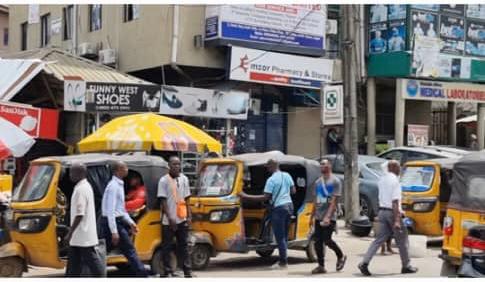Cross sections of Nigerians have expressed their displeasure over the astronomic increase in costs of things in recent times.
Costs of things have been on a steady increase with the inflation rate moving from 21.34 per cent in December 2022 to 22.41 per cent in May 2023. The recent surge in costs has been attributed to the sudden hike in the pump price of petrol following the removal of the subsidy.
Join our WhatsApp ChannelWhat appeared like a simple pronouncement during President Bola Tinubu’s inaugural speech on May 29, later degenerated into fuel queues in filling stations, artificial scarcity and a sudden jump in the prices of premium Motor Spirit (PMS) also known as petrol across the country.
One month after, the impact is already being felt across sectors of the economy.
President Tinubu had while announcing the end of the fuel subsidy regime, said it has become unsustainable and a drain on public finance, hence the need for it to go. According to figures from the Nigerian National Petroleum Company Limited (NNPCL), fuel subsidies cost the government over N400 billion (around $867 million) monthly.
Subsequently, in his June 12 Democracy Day address, President Tibubu said he is aware that the subsidy removal would “impose an extra burden on the masses,” but it was imperative that it should end for the sake of the country’s economic survival. He urged the people to make sacrifices in the interim while the government takes steps to cushion the effect on the citizens.
Some motorists, traders and artisans who spoke to Prime Business Africa over the weekend, lamented the impact of the subsidy removal on their businesses.
While some said they are hopeful that in line with government promises, the price of fuel would come down after some time, and stabilize the cost of things generally, others expressed worry that it would continue to linger and suffer the ordinary citizens.
Operators of tricycles popularly known as keke, in parts of Lagos lamented that the increase in price of petrol has affected their profit margins as their increase in fare is not commensurate with what they spend on buying fuel.
“To be sincere, the situation is tough and stressful. Before, we buy N200 per litre before now we are buying fuel N500. Some are even selling N520, and there is no increase in the number of passengers that we are carrying, but no matter how, we are going to survive,” James, a tricycle operator in Ajao Estate, Isolo, told Prime Business Africa.
READ ALSO: World Bank: Fuel Subsidy Removal To Reduce Money Supply In Nigeria, Raise Inflation Rate
The Keke driver said the union covering the area made it mandatory that they shouldn’t increase the price for the route they operate despite the fuel price increase, as a way of helping passengers but they are not finding it easy to cope with. He said they only increase prices during rush hours and heavy traffic when they spend longer time on a trip.
Another Keke driver, who identified himself as Idowu, expressed hope that the price of fuel would drop after some time. He however, said that if the government does not take necessary measures to bring down the price to an affordable rate as promised to Nigerians, commuters would be made to pay more in transport as they would push for their union leaders to upwardly review fares for routes they ply.
Also, speaking to Prime Business Africa, a vulcaniser, Emmanuel Joseph, said the increase in prices of fuel and other items he uses in repairing vehicle tyres has forced him to charge customers double what he used to collect before the subsidy removal.
Joseph who spoke in a blend of English and Pidgin said: “This fuel matter tie everybody for ear. Before, I charge N500 but now, na N1,000 for working on motor tyres but truck na N1,000. I buy fuel for filling stations at N500 and for the black market na N600 but before na N250 or N300 per litre.
“No be only fuel, everything cost including patch,” the vulcaniser added.
Traders Lament, Urges Government to Take Drastic Measures
During a Prime Business Africa survey at a market in Isolo, a tomato and pepper seller Haruna Mohammed, said the costs of the two commodities have skyrocketed in recent times because of increased transport fares. He said motorists now charge their suppliers more than double what they used to collect before because of what they spend on petrol.
READ ALSO: Women Turn To ‘Carrot Stew’ As Cost of Tomatoes Skyrockets In Nigeria
He said they currently buy a big basket of tomato at N100,000, against N45,000 some months ago, while that of pepper is N50,000 against N12,000 before.
The price of a small plastic bucket of fresh tomatoes in the market is between N7,000 and N8,000 while half of it is between N3,500 and N4,000 depending on the sizes and quality.
“We no dey sell N100 tomato again because of the cost now,” Ahmed, a tomato seller in Ilasa told a customer who wanted to buy a small quantity to prepare noodles for launch during the weekend.
Ahmed said the cost of tomatoes has led to a drop in the number of people who come to buy, but has hope that the price would come down for them to regain patronage.
Another woman, Evelyn Onoja, who sells rice, beans and other food items said she was shocked the last time she went to Mushin market as she could not pay for up to half of the goods she intended to buy because of the high costs.
“I don’t know what is happening my brother, I was shocked the last time I went to market, as the money I had on me could not pay for up to half of what I wanted to buy. I had to call my husband who sent me some money which I added to what I have to be able to make half payments and take the rest on credit.”
She called on the government to take necessary measures to control the costs of things across the country to alleviate the suffering of ordinary citizens.

















Follow Us